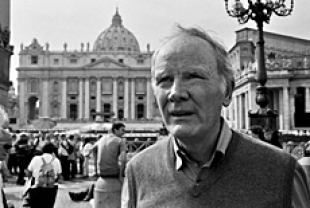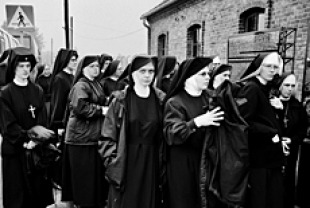Here is a perfect pairing of a committed and serious filmmaker, Oren Jacoby, and a National Book Award winner and practicing Catholic, James Carroll, whose 1991 book forms of the basis of this poignant and passionately presented depiction of church-sanctioned violence against Jews. Jacoby, the writer and director, was at the helm of Sister Rose's Passion about a nun who helped remove anti-Semitism from Catholic teaching materials. In Constantine's Sword he focuses on James Carroll's book of the same title, an ambitious mix of history, politics, theology, religion, and cultural criticism. A former priest, the author also includes reminiscences about being a military brat in Germany, a trip to Trier with his mother to witness the unveiling of the seamless robe of Christ, pilgrimages to Rome and Jerusalem, accounts of his protests against the war in Vietnam and his disagreements with his father, a three-star General in the U.S. Air Force. This blend of analysis with memoir also works well in Jacoby's documentary.
Carroll visits the U.S. Air Force Academy in Colorado Springs where Jewish cadet Casey Weinstein shares his feelings of being an outsider; he is constantly harassed by his peers, evangelical Christians who have a taken on a proselytizing mission to get Jews to accept Jesus as their Lord and Savior. This story segues into an examination of the depiction of Jews in the Gospels as the ones responsible for the death of Christ. Carroll makes a convincing case that Constantine, the Roman emperor who converted to Christianity, linked religion — the cross — to his secular power — the sword — justifying the making of war in the name of God. By the eleventh century, Christian Crusader mobs had exterminated Jewish communities in Trier and other places.
The demonization of the Jews under the Inquisition led to the creation of a walled-in ghetto in Rome; the inhabitants were forced to surrender their other property and rights and live in poverty and ignominy. The same ghetto strategy was later used by the Nazis in their war against the Jews. Carroll is highly critical of Pope Pius XII whose pact with Hitler stands out as a moral and ethical low point of modern Catholic history. He comments on the limited scope of Pope John Paul's apology to the Jewish people and Pope Benedict XVI's refusal to deal with the intolerance and violence of the past. Carroll ends at the burial grounds for Edith Stein, a Jewish convert to Christianity who died at Auschwitz. A large cross has been erected on the site.

